This Beginner Home Cook Essentials Guide is the foundation for most of what I post on The Homesmiths. We believe that high-quality recipes can replace our desire to eat out, saving us money and offering our family healthier food alternatives that taste professional.
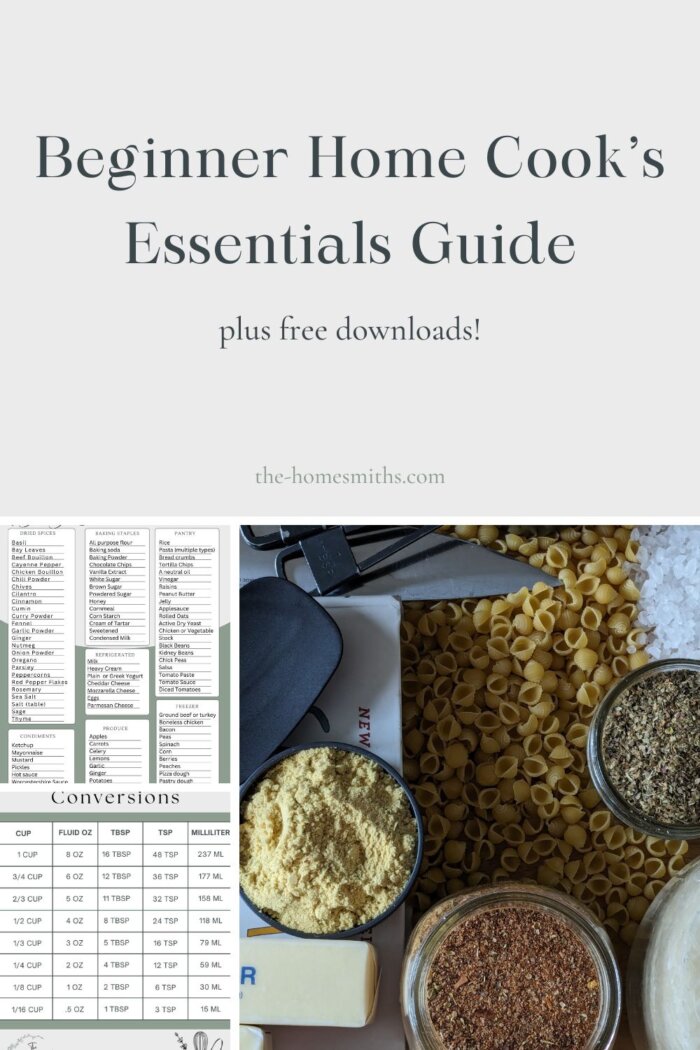
This is by no means an exhaustive list, I will regularly update this list as I think of, remember, or learn new things that can make a beginner home cook’s life easier. This is the information that I share with my friends who are starting their kitchens. Their life stages range from just out of high school to just getting married to wanting to try the “home cook” thing. All of that to say, no matter what stage of life you’re in, if you want to learn some basics or essentials of cooking, this is the guide for you!
It’s overwhelming to look at starting a kitchen. There is an upfront cost and a lot of knowledge is required to do it well. That’s hopefully where this page comes in. We want this page to be a helpful resource for you as you work on your kitchen skills or as you look to bless another as they start on their kitchen journey.
Disclosure: Some of the links below are affiliate links. This means that, at zero cost to you, The Homesmiths will earn an affiliate commission if you click through the link and finalize a purchase.
How should I begin to stock a kitchen as a beginner?
A well-stocked kitchen or pantry is essential to becoming a good beginner home cook. Having an array of ingredients on hand will help to ensure your ability to complete recipes and master skills.
This is a list of spices and pantry supplies that every beginner home cook should at least consider having in their pantry. These are the foundation of a lot of home-cooked meals. The quantity that you keep on hand will be dependent on what you use the most. This list is organized by where you would find things in your kitchen, not in the grocery store. This way when you are trying to decide what you need more of or want, you can be looking in one place at a time!
You can use this list as a shopping list too! We have a free downloadable version of this over on our Patreon!
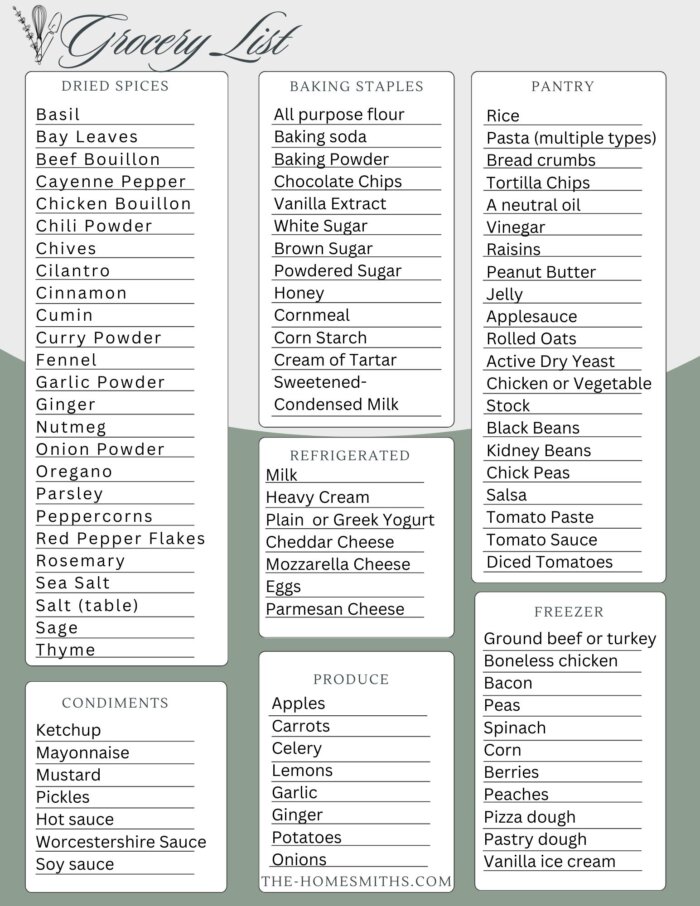
In general, stocking a kitchen is expensive. If you’re starting from the ground up and it’s your first time doing this, plan out a budget and stick to it! We would recommend discussing the things that you want and/or need from this list with your spouse (or roommate) at a family meeting! This way you have a plan for the expense and a timeline that you’re going to spread it over.
Dried Spices:
- Basil
- Bay Leaves
- Beef Bouillon
- Cayenne Pepper
- Chicken Bouillon
- Chili Powder
- Chives
- Cilantro
- Cinnamon
- Cumin
- Curry Powder
- Fennel
- Garlic Powder
- Ginger
- Nutmeg
- Onion Powder
- Oregano
- Parsley
- Peppercorns
- Red Pepper Flakes
- Rosemary
- Sea Salt
- Salt (table)
- Sage
- Thyme
Baking staples:
- All-purpose flour
- Baking soda
- Baking Powder
- Chocolate Chips
- Vanilla Extract
- White Sugar
- Brown Sugar
- Powdered Sugar
- Honey
- Cornmeal
- Corn Starch
- Cream of Tartar
- Sweetened Condensed Milk
Pantry:
- Rice
- Pasta (some long ones and some short ones)
- Bread crumbs
- Tortilla Chips
- A neutral oil (ie: corn, vegetable, avocado, grapeseed)
- Vinegar (white vinegar and if there is space, apple cider vinegar and balsamic vinegar)
- Raisins
- Peanut Butter
- Jelly
- Applesauce
- Rolled Oats
- Active Dry Yeast
- Chicken or Vegetable Stock
- Black Beans
- Kidney Beans
- Chickpeas
- Salsa (and/or Rotel tomatoes)
- Tomato Paste
- Tomato Sauce
- Diced Tomatoes
Refrigerator:
- Milk
- Heavy Cream
- Plain Yogurt (I use Greek)
- Butter
- Cheddar Cheese
- Mozzarella Cheese
- Eggs
- Parmesan Cheese (the wedge that you get in the fridge section is best but not in our families budget, so we just use the stuff in the pasta aisle)
Fresh Produce:
- Apples
- Carrots
- Celery
- Lemons
- Garlic
- Ginger (can be stored in the freezer)
- Potatoes
- Onions
Condiments:
- Ketchup
- Mayonnaise
- Mustard (plain yellow and then dijon if there is space)
- Pickles
- Hot sauce
- Worcestershire Sauce
- Soy sauce
Freezer:
- Ground beef or turkey
- Boneless skinless chicken
- Bacon
- Peas
- Spinach
- Corn
- Berries
- Peaches
- Pizza dough (if you are not going to make your own)
- Pastry dough (pie dough or puff pastry) (if you are not going to make your own)
- Vanilla ice cream or cool whip
All of the above items are what I regularly keep stocked in my pantry. Most of them I use at least weekly. While this would be expensive to buy all of it in one go, you can purchase them slowly over a few months. I believe that this encompasses enough of the basics that you will be able to attempt most recipes without having to make a grocery run.
Depending on what types of food you end up making the most, you can add more of the ingredients that you use regularly to this list. But this is a basic list that consists of what I’ve gifted friends and family who just get their own place.
What tools should be in a beginner home cook kitchen:
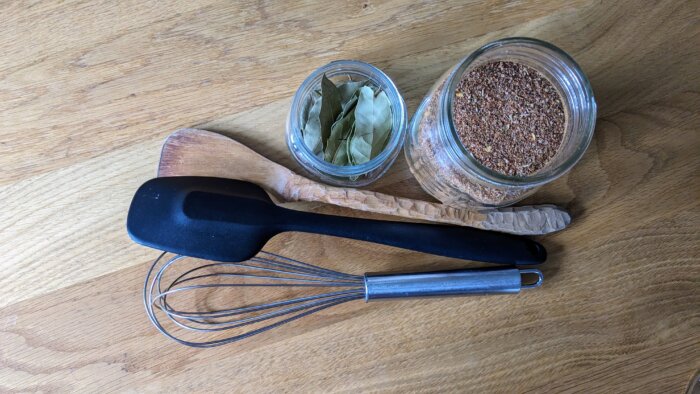
These are the tools and equipment that most beginner home cooks will find important and helpful. Again, this is not a comprehensive list and there are plenty of things I don’t have listed that beginners might enjoy. Obviously, a kitchen aid mixer is a fantastic tool but it is not necessary, so I didn’t include it in the list!
Of course, some of these are not immediately necessary. They are convenient and helpful and are the first step towards more specialty items. Figure out which ones you feel like you need or want first and plan to get those as soon as you can. Otherwise, if there are some things you would like but don’t want to spend on yet, ask for them for the holidays!
- Kitchen shears
- Chef’s knife– This knife is the one we use in our kitchen and it’s fantastic!
- Cutting boards– Our preference is plastic or granite for meat and then use wooden or bamboo for bread and produce
- Can Opener– We’ve had this one for 5 years and it still works great!
- Peeler
- Mesh Strainer
- Instant Read Thermometer– We use this specific one.
- Measuring cups and spoons
- Mixing bowls
- Whisks
- Spatula– We recommend getting an assortment of shapes and sizes if possible!
- Mixing/Stirring Utensils (heatproof)– There are some great options with assortments of tools that we would recommend!
- Angled spatula
- Box grater
- Food storage containers– These would be primarily for leftovers and food prep.
- Tin Foil
- Plastic Wrap (or beeswax)
- Ziploc bags in assorted sizes- We use silicone reusable ones!
- Parchment Paper
- Hand Mixer
A quick note
Baking dishes, pots, and pans can somehow be controversial as to whether or not they need to be nonstick or cast iron. There are so many varieties of materials. For example, you can get nonstick, glass, ceramic, stainless steel, enamel, and many others I’m sure.
This would be a great thing to discuss in a family meeting before making the final purchasing decisions!
- 9 x 13 baking dish
- 8×8 baking dish
- Loaf Pan
- 2 8 inch round cake pans
- 12 count muffin tin
- Baking sheet– Specifically 9×13 but smaller ones will typically work too!
- Small, medium, and large saute pans– Our preference would be for you to have several, but if you only have the space or budget for one, then we would recommend a medium sized one to start!
- Small, medium, and large pots– Just like pans, we would say having a few sizes is best, but if you can only start with one, go with the medium.
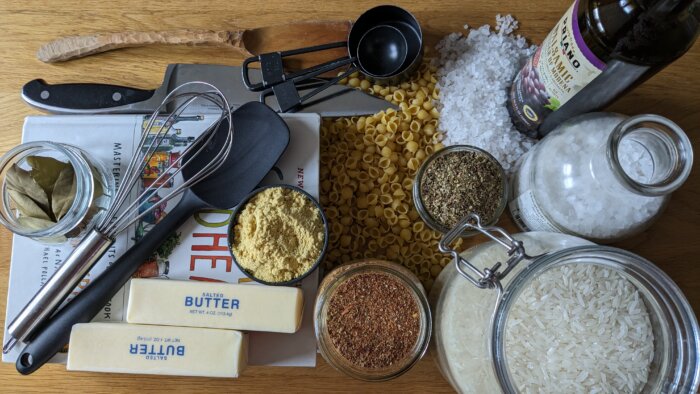
What are the basic knowledge requirements for a beginner home cook?
This might seem like a silly thing to add to a beginner’s home cook essentials guide, but I think it’s worth discussing.
As you begin cooking, following a recipe, and then over time learning to adjust to your preferences, you will become a better cook. Experience is a great teacher. Up until that point though, there are some things that you should either know, memorize, or have on hand to reference.
Have some cookbooks that you read for fun and inspiration. Your favorite cookbooks are a great housewarming gift too!
I recommend the book Salt, Fat, Acid, Heat to everyone that I know who wants to cook. While it is a cookbook it is more of a cooking technique book. Read it, study it, memorize it, and repeat. It has forever changed my cooking for the better.
Another thing that will be very helpful to learn and memorize if possible is kitchen conversions. When I was younger, part of my schooling was to memorize some of these and I am forever grateful. Knowing the conversions makes cooking and baking so much easier. That’s especially true if you want to double, triple, or halve a recipe!
Check out the conversion chart that we made! It’s a free download over on our Patreon!
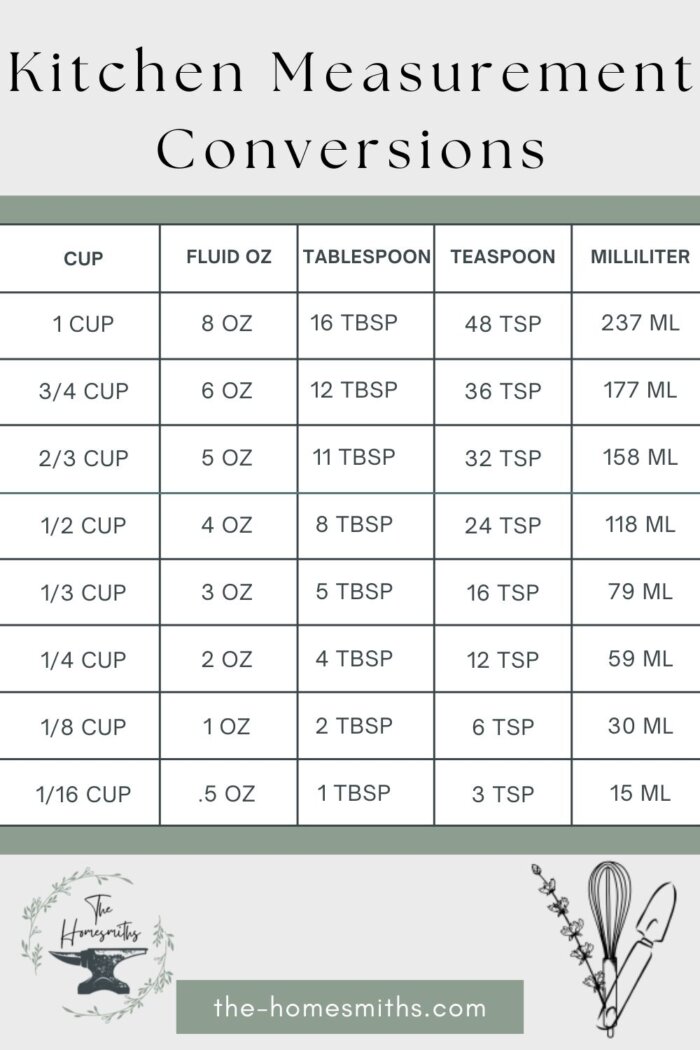
Beginner Home Cook- Cooking Tips
Find simple recipes that are appealing to you.
A recipe may seem like a great starting point but if it doesn’t appeal to your taste you will not be able to accurately evaluate how well you made it. Read through cookbooks or find recipes on Pinterest that appeal to you.
You can search for 5 ingredient meals or simple breakfasts. You can find recipes that are focused on key ingredients like chicken, bacon, or rice. Or you could search and practice only one type of food. Italian is a great starting place for a beginner home cook.
Read recipes in full before you start cooking.
I cannot emphasize this enough. First of all, with AI, some recipes are written poorly, missing ingredients, and don’t end up actually working. You can figure that out if you read the recipe from start to finish.
Secondly, by reading the recipe ahead of time, you know how much time each step should take and in what order you need to do it. You can make sure that you have all of the ingredients and the right quantity on hand.
Being prepared before you start the recipe is one of the best ways to ensure success.
Follow the recipes exactly and make them often.
When you are first starting, follow the recipes exactly as they are written. Don’t deviate and add more or less of something and don’t substitute! You need to get used to the ingredients that you’re working with and how they mix and cook. As you repeat the recipe each time you can slowly adjust seasonings, cook times, and ingredients to your preference.
Learn skills one at a time.
Don’t start a recipe that requires you to learn multiple new things at a time. Learn how to cut your food the right way, learn how to perfectly grill different meats, learn how to whip cream, or create a meringue. These are all great things to learn! However, I recommend that you try to only learn one at a time. Learn how to do it so that you can do it almost without thinking. Then learn the next thing.
Knife skills, sauteing, roasting, and blanching are all important skills to learn! I would recommend picking one of these to start learning.
Taste everything at each step when possible.
I’m not talking about raw meat or eggs here! But as you cook and add seasonings to your dishes, taste them. This helps you to be able to identify different spices and flavors and what works well with others. Then you will learn how to customize recipes better because you understand flavors better.
Always keep your knives sharp.
Sharp knives will make food prep and serving a lot easier. You may have heard it before, but it’s worth repeating: Dull knives are dangerous!
We sharpen our knives with a whetstone. It takes some getting used to but there is not much as satisfying as a freshly sharpened knife.
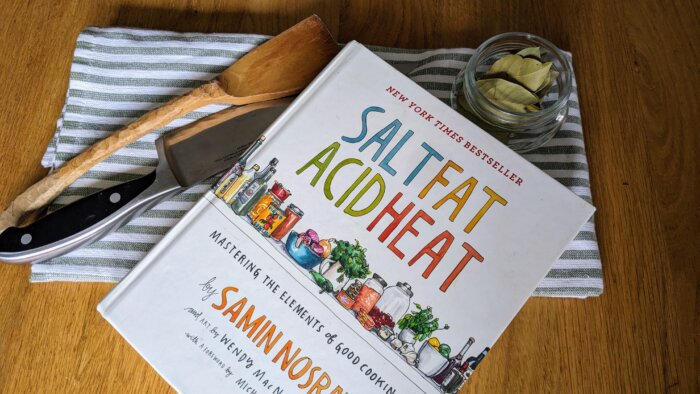
In conclusion, it can be intimidating or overwhelming to look into beginner home cook essentials. However, when you have a well-stocked pantry and kitchen, and you have some basic skills and tips for starting, you can jump into cooking with some confidence! Hopefully, this list of items and suggestions has been helpful to you. Let us know in the comments below if there is anything that we missed in this list! We would love to hear your thoughts and especially your experiences surrounding being a beginner home cook.
Save it for later!


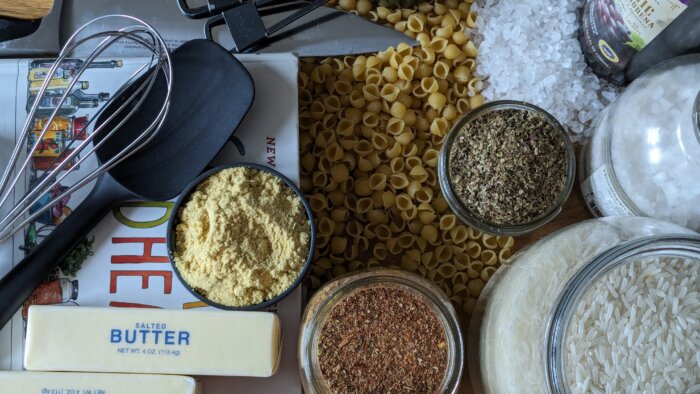
I so wish I had this list 5 years ago when I got married! I could have enjoyed cooking a lot sooner- it intimidated me for so long lol, so much great info!
Thank you so much! I’m glad that you feel it’s good info!
This is a great list! It will help many people, beginners and not, know what they need for staples!
Thank you so much!
Love ❤️ this guide! Even now I go to recipes and don’t have some ingredients it’s frustrating. We also learn our preferences for different spices-and need to keep restocking them. I look forward to your next post’
Thank you so much, you’re so encouraging!
This is a wonderful kitchen guide! Very thorough and helpful!
Thank you so much!
This is such a great round-up & resources!
Thank you, I appreciate that!
This is such a great post!!!! Thank you so much for this, as I am still learning how to be more efficient in the kitchen!
Thank you so much! I’m so glad it’s helpful.
I lean toward minimalism in my kitchen and I appreciate that your list of kitchen utensils was basic, but they will help you accomplish everything you could imagine! We don’t need to be fancy to cook from hearty, healthy meals from scratch! and I need to sharpen my knives… LOL
Thank you so much for your positivity and encouragement! And I always forget to sharpen my knives, my husband walks into the kitchen as I’m complaining about things being difficult to cut and he always reminds me!
Great tips and tricks! Thanks for sharing!
Thank you!
Love this! Your lists are thorough without being overly specific.
Thank you so much!